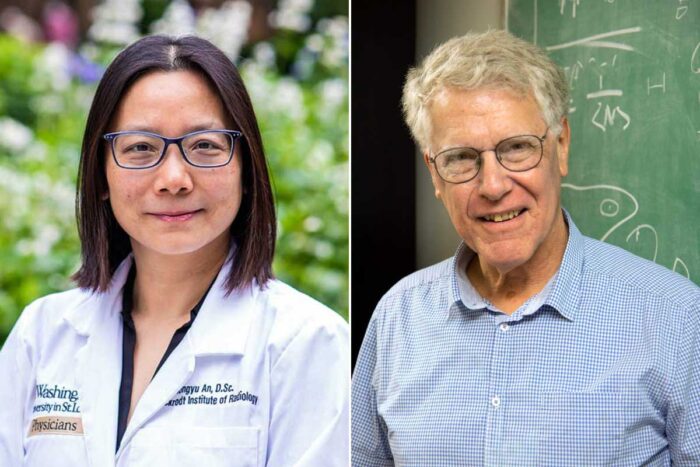An, Elson named 2023 AIMBE fellows
Recognized for research, innovation in medical and biological engineering
 Washington University School of Medicine
Washington University School of MedicineHongyu An, PhD, (left) a professor of radiology, and Elliot Elson, PhD, a professor emeritus of biochemistry and molecular biophysics, both at Washington University School of Medicine in St. Louis, have been named fellows of the American Institute for Medical and Biological Engineering.
Two faculty members at Washington University School of Medicine in St. Louis — Hongyu An, PhD, a professor of radiology at the School of Medicine’s Mallinckrodt Institute of Radiology (MIR), and Elliot L. Elson, PhD, an emeritus professor in the Department of Biochemistry and Molecular Biophysics — have been named fellows of the American Institute for Medical and Biological Engineering (AIMBE). They are among 140 engineers and engineering researchers who were inducted March 27 in Washington, D.C.
AIMBE’s College of Fellows is limited to the top 2% of medical and biological engineers and are those who are regularly recognized for their contributions in teaching, research and innovation. Membership honors those who have made outstanding contributions to engineering and medicine research, practice or education, and to “the pioneering of new and developing fields of technology, making major advancements in traditional fields of medical and biological engineering or developing/implementing innovative approaches to bioengineering education.”
An works on developing new magnetic resonance (MR) imaging and combined positron emission tomography (PET) and MR methods to improve clinical diagnosis and patient management. Her research has led to the first validated MR technique to measure how much oxygen a person’s brain is using at a given moment. Oxygen utilization is a key indicator of brain function and metabolism, and changes in several brain diseases. This imaging technique has helped answer critical questions related to the impact of sickle cell disease on children’s brains, the effects of strokes caused by blood clots, prediction of stroke risk, and the mechanisms of vascular dementia, a common form of dementia resulting from conditions that affect the blood vessels in the brain.
An is also a professor of neurology at the School of Medicine, a professor of biomedical engineering and of electrical & systems engineering at McKelvey School of Engineering, and director of the Biological MR Center and the associate director of the Center for Clinical Imaging Research at MIR.
Elson is known for his pioneering role in developing microscopy methods that are now standard tools in the field of biophysics.
Thousands of researchers around the world utilize fluorescence correlation spectroscopy and fluorescence recovery after photobleaching, methods Elson developed to reveal the complex inner workings of cells and their environments. His papers on these methods have had a tremendous impact on the field, with more than 5,000 citations in the scientific literature.
With these techniques, as well as newer methods he has developed, Elson and scientists around the world can study how cells move, change shape and maintain their structure. His contributions to microscopy have revealed important insights into proteins on cell surfaces, key information for understanding cellular structure and function.
To read about all four of the university’s newly named AIMBE members, see here.






